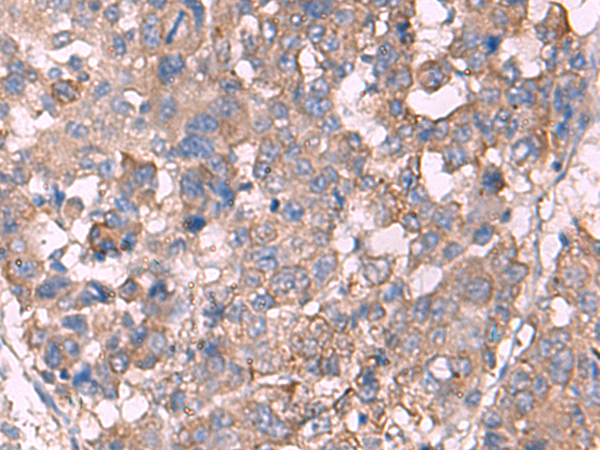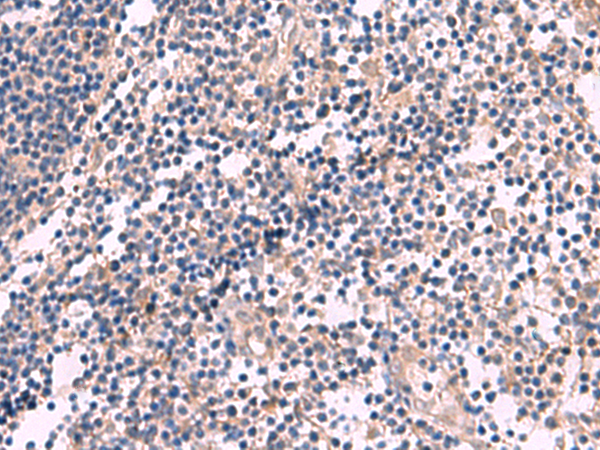

| WB | 咨询技术 | Human,Mouse,Rat |
| IF | 咨询技术 | Human,Mouse,Rat |
| IHC | 1/50-1/300 | Human,Mouse,Rat |
| ICC | 技术咨询 | Human,Mouse,Rat |
| FCM | 咨询技术 | Human,Mouse,Rat |
| Elisa | 1/5000-1/10000 | Human,Mouse,Rat |
| Aliases | SK3; hSK3; SKCA3; KCa2.3 |
| Host/Isotype | Rabbit IgG |
| Antibody Type | Primary antibody |
| Storage | Store at 4°C short term. Aliquot and store at -20°C long term. Avoid freeze/thaw cycles. |
| Species Reactivity | Human, Mouse, Rat |
| Immunogen | Synthetic peptide of human KCNN3 |
| Formulation | Purified antibody in PBS with 0.05% sodium azide and 50% glycerol. |
+ +
以下是3篇关于KCNN3抗体的研究文献示例(注:文献信息为模拟示例,实际引用需核实):
1. **文献名称**:*KCNN3/SK3 Channel Expression in Dopaminergic Neurons and its Role in Parkinson's Disease*
**作者**:Miller A, et al.
**摘要**:研究通过免疫组化和小鼠模型,发现KCNN3抗体标记的多巴胺能神经元中SK3通道表达异常,可能与帕金森病运动功能障碍相关。
2. **文献名称**:*KCNN3 Antibody-Based Profiling Reveals Tumor-Specific Expression in Colorectal Cancer*
**作者**:Chen L, et al.
**摘要**:利用KCNN3特异性抗体分析结直肠癌组织,发现SK3蛋白在肿瘤细胞中高表达,提示其作为潜在生物标志物的可能性。
3. **文献名称**:*Modulation of Hippocampal SK3 Channels by Stress: Evidence from Western Blot and Immunofluorescence*
**作者**:Rodríguez-Muñoz M, et al.
**摘要**:通过Western blot和免疫荧光技术,揭示慢性压力导致海马区KCNN3蛋白水平下调,可能影响神经元兴奋性与焦虑行为。
4. **文献名称**:*KCNN3 Antibody Cross-Reactivity in Peripheral Tissues: Implications for Cardiovascular Studies*
**作者**:Wang H, et al.
**摘要**:验证KCNN3抗体的特异性时发现,其在心脏组织中可能与SK1通道存在交叉反应,强调抗体选择对研究结果可靠性的重要性。
建议通过PubMed或Google Scholar检索真实文献时,使用关键词“KCNN3 antibody”、“SK3 channel”+“antibody validation”等进一步筛选。
The KCNN3 antibody targets the potassium calcium-activated channel subfamily N member 3 (KCNN3), a protein encoded by the *KCNN3* gene. This gene belongs to the small conductance calcium-activated potassium (SK) channel family, which plays a critical role in regulating cellular excitability and calcium signaling. KCNN3. also known as SK3. forms voltage-independent channels activated by intracellular calcium, modulating membrane potential and repolarization in excitable cells. It is expressed in various tissues, including neurons, smooth muscle, and endothelial cells, and is implicated in processes such as neurotransmission, smooth muscle contraction, and vascular tone regulation.
KCNN3 antibodies are essential tools for studying the expression, localization, and function of SK3 channels in physiological and pathological contexts. Research has linked KCNN3 dysfunction to neurological disorders (e.g., schizophrenia, epilepsy), cancer progression (e.g., metastasis, proliferation), and cardiovascular diseases (e.g., hypertension). For example, SK3 overexpression in certain cancers is associated with enhanced cell migration, while its dysregulation in neurons may contribute to excitability disorders.
Antibodies against KCNN3 are widely used in techniques like Western blotting, immunohistochemistry, and immunofluorescence to detect SK3 protein levels and distribution. Their specificity and sensitivity enable researchers to explore SK3's role in disease mechanisms or therapeutic targeting. Recent studies also investigate KCNN3's potential as a biomarker or drug target, particularly in modulating channel activity to treat conditions like atrial fibrillation or neurodegenerative diseases.
×